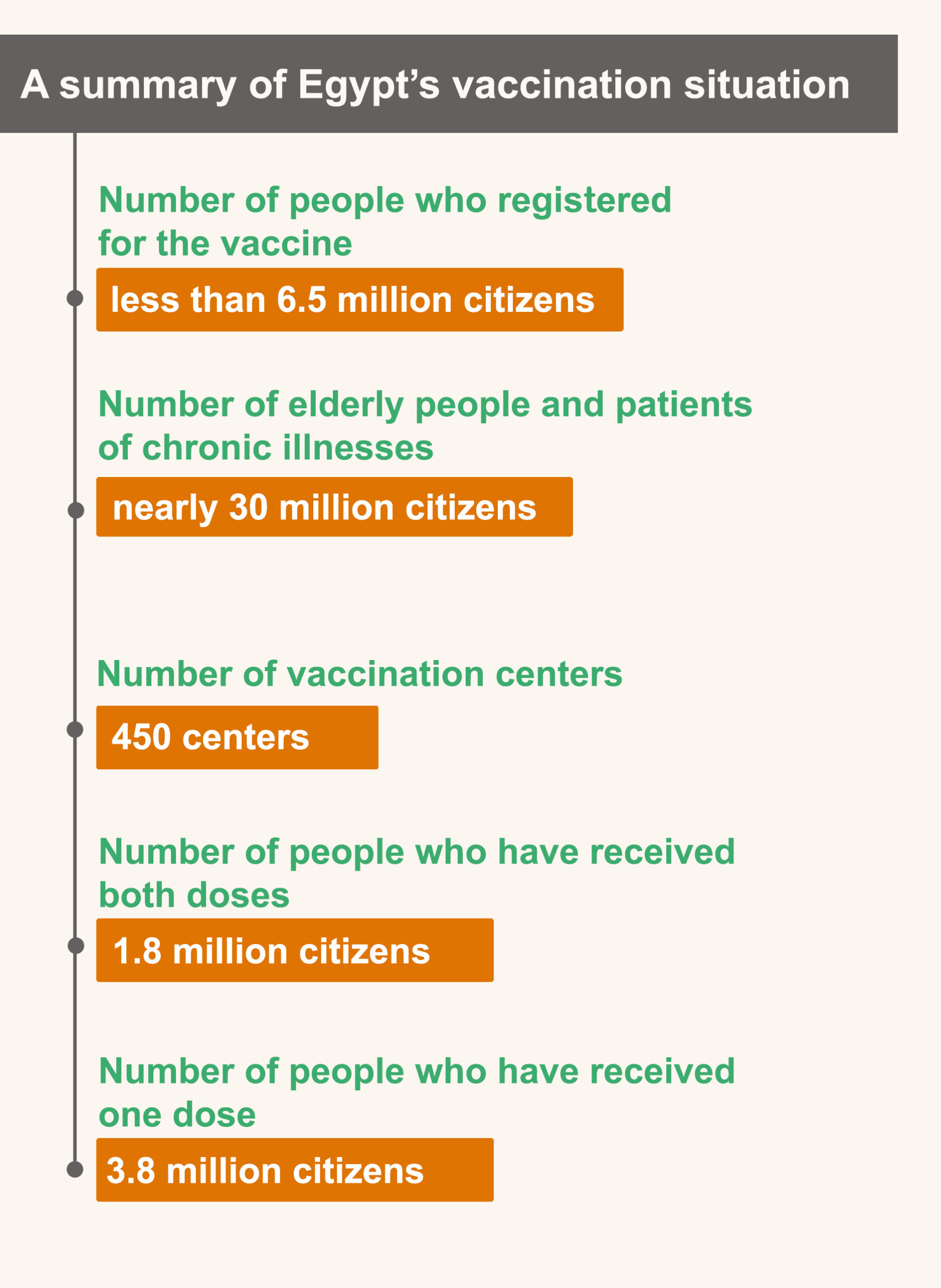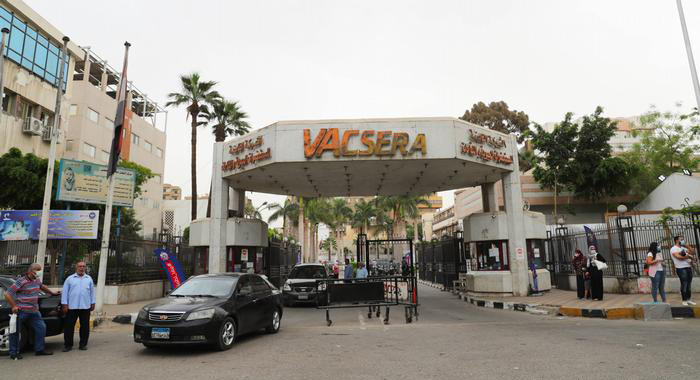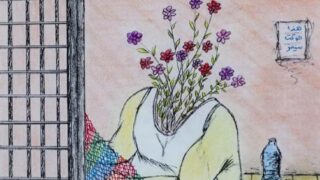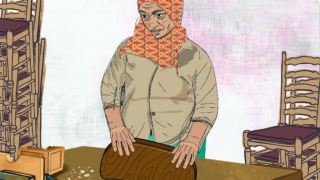
This publication has benefited from the support of the Rosa Luxemburg Foundation. This text may be reproduced in part or in full, provided the source is acknowledged.
This country has 100 million people for a population. The World Bank lists it as one of the promising developing economies, and its authorities ensure its involvement in volunteering and providing support in numerous tough humanitarian situations around the world. This includes donating medical supplies to China, Italy, and the United States during the first wave of the pandemic. Despite all the aforementioned, and more than a year and a half into the outbreak around the world, the number of Covid-19 vaccinations in Egypt has not exceeded 3.8 million citizens.
According to the data issued by the European Centre for Disease Prevention and Control (ECDC) on August 10th, 2021, 3.8 million people in Egypt have had one vaccination, while 1.8 million received both doses of the vaccine. According to statistics, this adds up to a rate of no more than 7.1 doses per 100 thousand citizens.
Is this a question of injustice, then – the same that prevails over vaccine manufacturing around the world – with major powers having access to the biggest shares? Or were there delays and negligence in the steps that the Egyptian government has taken, resulting in a limited success, despite the frantic efforts in the past few months to announce contracts and deals? Is the question linked to official sides that stepped away from the issue in Egypt? What about costs and gifts? Why did the country initially propose to provide the vaccine in exchange for money, at a moment that no country around the world has lived before? How and when could Egypt achieve the minimum level of required vaccinations? (10 to 30 percent of the population, according to the World Health Organisation (WHO)).
While one could say that Egyptian society is close to attaining its target, in its most recent reports, WHO stated that any delays in administering the vaccine help the virus mutate. According to the report, this would reduce the vaccine’s efficacy, while the vaccination campaign would have no effectiveness before covering 70 percent of the world’s population.
Figures: What they imply and signify
The real scope of achievement cannot be measured by the number of vaccinations administered among Egypt’s population only (which covers no more than 4 percent), but also through other important ratios. This includes the number of people who receive the vaccine on a daily basis, and the difference between the number of applications for the vaccine and those who actually receive. It also includes comparisons between vaccination rates and availability in geographically neighbouring and economically similar countries.
When comparing figures recorded based on international statistics in both June and August 2021, one finds that the number of first vaccinations has increased. It grew from 3.3 million to 3.8 million people. The number of second vaccinations, on the other hand, has grown from 695 thousand to 1.8 million.
Contrary to what could be expected, this means that there was bigger focus on administering second doses to people on time (three months after receiving the first dose) rather than expanding the range of first vaccinations, where Egyptians would be urged to head to vaccination centres for the first time. Such a difference reflects the limits of the authorities’ capacity to progress at a quick rate and quickly provide services to everyone who applied for the vaccine. This comes at a time when the Ministry of Health itself announced that the number of vaccine applicants, by April 2021, had not exceeded 850 thousand citizens. The number increased over the next few months, however, and reached, by June 2021, 6.5 million citizens – which represents less than 7 percent of Egypt’s population.
Vaccination in Egypt began in mid-February, when medical teams that worked in isolation hospitals began to receive their shots. An open call for vaccination was then placed for all citizens to register, elderly groups and people with chronic illnesses in particular. Initially, the number of available centres across Egypt did not exceed 40 centres. By the end of March, however, the number had grown to 148 centres, and, by the end of June, to 420 centres.
According to press testimonials, during this past July, complaints multiplied about late vaccination appointments and a waiting period that lasted more than 3 months.
One could read the figures in the Egypt in light of the short-term targets set by WHO . Accordingly, no less than 10 percent of every country’s population should have been vaccinated by September 2021, 40 percent by yearend. Likewise, 250 additional million doses should be provided by September and 100 million by June and July only – so that no less than 70 percent of the world’s population would be vaccinated by the beginning of the upcoming year – to end the pandemic. In parallel, the Group of 7 (G7) had announced that it would donate one billion doses all the way through 2022.
These figures require much explanation, to be started by asking the following questions:
A system and a mechanism: How did it start? How does it continue?
Vaccination in Egypt began in mid-February, when medical teams that worked in isolation hospitals began to receive their shots. An open call for vaccination was then announced to all citizens, elderly groups and people with chronic illnesses in particular.
Former statements about lack of free vaccines have played their own role in a delayed popular response. At the beginning of 2021, the Minister of Health stated that the government intended to provide vaccines priced at 100 Egyptian pounds a dose. Accordingly, it would limit free vaccines to people incapable of paying such an amount, and who are covered under the state’s social insurance regime. The latter include no more than 3.5 million households, which amounts up to 15 million citizens.
Initially, the number of available centres across Egypt did not exceed 40 centres. By the end of March, however, the number had grown to 148 centres, and, by the end of June, to 420 centres.
In a country with 57.8 of its population residing in rural areas, 40 percent of its urban population living in shantytowns, and 35.8 percent of its population illiterate – registration for the vaccine is only available online (figures taken from the Central Bureau for Public Mobilisation and Statistics).
The vast majority of the population was thus rendered incapable of self-registration, let alone making up their own mind about vaccination. This was especially the case as media campaigns to raise awareness were late to launch, and would only start in May 2021 (which might explain why registration rates rose within the span of one month). Things changed, however, when a mobile cars vaccination campaign launched a few weeks ago. The campaign targeted elderly people, who would be vaccinated as they lined up to receive their monthly salary by post offices. Such a step has yet to spread, though, or travel beyond major cities, to which it is currently limited.
Former statements about lack of free vaccines have played their own role in a delayed popular response. At the beginning of 2021, the Minister of Health stated that the government intended to provide vaccines priced at 100 Egyptian pounds a dose.
Accordingly, it would limit free vaccines to people incapable of paying such an amount, and who are covered under the state’s social insurance regime. The latter include no more than 3.5 million households, which amounts up to 15 million citizens. Political, legal, and medical milieus throughout Egypt have launched a campaign to demand approving free vaccines for all social groups, same as in the rest of the countries around the world.
In parallel, the vaccination campaign in Egypt has lacked those systemic measures that monitored vaccinated individuals’ medical state or registered their post-vaccine side effects. Rather, the campaign has been limited to offering an “informed consent” form for signature, and providing telephone numbers to answer to any medical complications that may arise.
Mapping out the vaccine: achievements and promises
Regardless of the scope of the vaccine roll-out and distribution measures, the most urgent question since the introduction of the vaccine in Egypt has remained the same: Which vaccines shall be provided, and when?
In a statement in November 2020, Egypt’s Presidential Advisor for Health Affairs said that “Egypt is well prepared” and added that “There is a very solid agreement with GAVI and the international platform, COVAX, both of which are overseeing the approval of the vaccines”. Once these vaccines are made commercially available, “We’ll fetch Egypt the vaccines”.
Earlier, Egypt partnered up with the Chinese vaccine company, Sinopharm, for clinical trials. This grants it moral rights to receive large quantities of the vaccine, once approved and manufactured. Media campaigns subsequently encouraged Egyptians to sign up as volunteers for these trials.
Naturally, the first vaccination campaign targeted medical teams. The Chinese vaccine, which the international scientific journal Nature described as a vaccine with an efficacy rate of no more than 50.4 percent, was mainly relied on. That is, in a country where death tolls were most elevated among medical teams, especially among doctors (600 doctors until now).
It became clear that adopting the Chinese vaccine for medical teams in particular was driven by the short waiting period between the two doses (3 weeks) – when compared with its British-Swedish counterpart (AstraZeneca), the only other vaccine available in Egypt. In the meantime, doctors raised demands for deals containing large quantities of the Russian vaccine, considering it to be more effective and less expensive in comparison with its two American and European counterparts.
Egypt partnered up with the Chinese vaccine company, Sinopharm, for clinical trials. This grants it moral rights to receive large quantities of the vaccine, once approved and manufactured. Media campaigns subsequently encouraged Egyptians to sign up as volunteers for these trials.
According to official reports, the first Snipharm shipment into Egypt was received in Egypt in February 2021, carrying in 200 thousand doses. Three months later, it was followed by a second batch, with 400 thousand doses, while an official statement issued by the Ministry of Health said that the overall number of contracted doses with China should be 900 thousand doses.
In her speech addressed to the House of Representatives in February 2021, the Minister of Health said: “A memorandum of understanding has been signed between Egypt and the Republic of China, to strengthen cooperation between the two countries in terms of research, development, and production. The first batch of Sinopharm vaccines was received and distributed to medical teams in isolation, screening, chest, and pyrectic hospitals in a number of Egypt’s governorates. The next batches are underway, to be delivered in the upcoming period. The Minister added that the AstraZeneca vaccine was included in the agreement, which also approved an emergency use of the vaccine factory in India (Serum). The agreement also approved obtaining 50 thousand first doses and contracting the Global Alliance for Vaccines and Immunizations (GAVI) in order to receive 40 million doses of the Covid-19 vaccine (two doses per 20 million citizens). Overall, the minister noted that Egypt has managed to conclude deals to obtain 100 million doses of the vaccine.
Autism in the Time of Corona
28-06-2021
These deals were announced after the Minister of Health visited Geneva in mid-June, where she met with the director general of the COVAX facility, affiliated with GAVI. She said that she has “thanked the COVAX facility for providing Egypt with around 2.2 million AstraZeneca doses throughout the past period, and for prioritising Egypt when exporting vaccines, amidst global challenges related to limited production and increased demand.” She added that “within days, Egypt is expected to receive around 1.9 million Covid-19 doses”, and indicated that a complementary plan was discussed. The latter would import the announced 40 million doses, while future shipments would begin to arrive within the second trimester of the agreement, that is, throughout July and August 2021.
Local production: Has Egypt found a way out?
Manufacturing vaccines within Egypt was, and still is, a dream that Egyptian society entertained, especially with a pioneering background, dating back to the 1950s, in manufacturing and supplying vaccines to Africa. Throughout the past ten years, however, Vacsera has experienced what most state-owned industrial sectors have. Company experts accused the state of voiding it of advanced technology, which is an extremely important issue. Recently, an announcement was made to rehabilitate the company’s factories, while the morning of July 5th ended with a first attempt to produce a batch of vaccines. In partnership with the Chinese vaccine manufacturer, Sinovak, 300 thousand doses were announced to have been produced, although they have yet to hit the market.
In mid-June 2021, during a videoconference with WHO representatives and her counterparts in other countries, including China and Brazil, and in an attempt to introduce possible viable options for Egypt to join the vaccines local production program and make them available before the final trimester of the current year, the Minister of Health referred to the President of the Republic’s instructions to the government. He had ordered that all necessary materials needed to increase national production capacities were to be provided, including all medical supplies and pharmaceuticals. This would be carried out through what the minister termed as “Egypt’s national strategy to invest in local pharmaceutical production”. She also noted that this would be consolidated by the inauguration of the Egyptian Drug City (a new industrial state-owned platform in Egypt).
Manufacturing vaccines within Egypt was, and still is, a dream that Egyptian society entertained, especially with a pioneering background in vaccine production and provision to Africa, dating back to the 1950s. This large locomotive, however, called Vacsera (or the holding company for manufacturing vaccines) has experienced what most state-owned industrial sectors have.
The minister later visited the company factories and gave other statements concerning a plan to provide 17-million-dollars’ worth of technology and equipment needed to produce a quota of 3 million doses of vaccine a day; this should cover local need and exports to African countries. More recently, the minister met with the head of the Egyptian Authority for Unified Procurement, Major General Dr Bahaa El-Din Zaidan, previously approached, in lieu of the Minister of Health, in a number of general meetings by the President of the Republic – to discuss pandemic response developments.

On July 5th, 2021, the prime minister visited vaccine manufacturers, as first tidings of producing one million doses of the Vacsera/Sinovak vaccine were announced. Pictures were published and promises were made that the vaccine would be administered in numerous vaccination centres across Egypt. Two months later, however, none of this has happened.
Vaccines in Morocco: A Chinese Adventure
26-09-2021
On the other hand, questions were raised about the role of the private sector and the ways it could contribute. During its campaign to combat viral hepatitis, Egypt lived through a distinguished experience. Representatives of the National Committee to Treat Viral Hepatitis, a medical authority, successfully negotiated with the American biopharmaceutical company, Gilead, manufacturer of the famous Sovaldi treatment, dropping intellectual ownership rights over the vaccine and enabling tens of companies on the Egyptian market to produce it. An abundance of effective alternatives was thus made available, and at 10 percent lower than the initial price placed into American markets. Some of these local companies thus announced their desire to enter the market through an official international cooperation to manufacture vaccines.
And yet, there are some well-founded concerns when it comes to letting the private sector participate and set their own fees. During the Covid-19 response efforts, private hospitals in Egypt contributed to an extremely terrible experience, with overexaggerated price lists and without any real state intervention.
What do live testimonies reveal?
After such big statements, nothing yet has truly happened on the ground. On her social media pages, journalist Rahma Sami posted: “I’ve applied to receive the vaccine four months ago, yet and no appointment has been fixed yet”. Shaimaa Adel says: “Over the course of one month I have received messages to postpone my second vaccination. A timeframe must be respected, though, between the administration of the two doses. When I tried to inquire into it and complain, I was asked to comply with the procedures and that I would be contacted later”. Journalist Inas Kamal wrote about the guilt she felt following her mother’s death: “I don’t know… Was I too late to register her for the vaccine? Two months passed before I received a message fixing her appointment, which was one week after her death, caused by Covid-19”.
In an article titled “The Vaccine is Late”, critic and journalist Abla al-Roweini wrote on a governmental newspaper’s page: “I have yet to manage to receive a Covid-19 shot, even though I’ve registered for the vaccine (in the city of Nasr) more than two months ago! Even though I’ve followed up on the vaccination date and repeatedly asked about its delay. The response would always be that ‘We have your name registered here, but your vaccination date hasn’t come up yet’”. The same delay was noted by one of the doctors (supposed to be prioritised for vaccination) who, for more than two months, couldn’t get the vaccine – due to shortages in both Chinese and English vaccines.
There are some well-founded concerns when it comes to letting the private sector participate and set their own fees. During the Covid-19 response efforts, private hospitals in Egypt contributed to an extremely terrible experience, with over exaggerated price lists and without any real state intervention.
Appeals and protests all back up these figures. They indicate that the range of demand is many times the extent of achievement. The desired number remains “30 million”, agreed upon as a rough estimate, which should cover the elderly and people with chronic illnesses. Meanwhile, a fourth wave of Covid-19 has broken out once more in Egypt, but the number of daily infections seems to be a small one: 100 daily infections. On the eve of August 10th, 2021, the overall number of officially recorded infections reached more than 285 thousand – figures that do not represent the full scale of infections. According to a statistical model announced by the cabinet at the onset of the pandemic, figures could reach ten times more that number.
***
The target is yet to be reached, the dream endures, and reaching a real achievement, bolstered by transparency and eliminating heated propaganda is the desired end.
The content of this publication is the sole responsibility of Assafir Al-Arabi and Rosa Luxemburg Foundation cannot accept any liability for it.
Translated from Arabic by Yasmine Haj
Published in Assafir Al-Arabi on 19/08/2021
1) Click here to see worldwide statistics.







